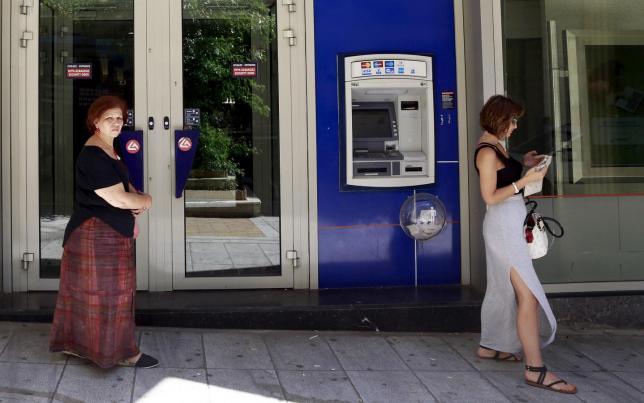Greek bank recap is race against time

Greece is racing against time to recapitalise its banks. Capital must be injected by year-end, when euro zone rules on financial bailouts change. This is to avoid a haircut of uninsured depositors, which could cause the country to enter a new downward spiral.
To meet the deadline, lots of things need to fall into place. The European Central Bank first has to finish its stress test to decide how much capital the banks, whose balance sheets have been hit by capital controls and recession, require.
The four systemically important banks – Alpha, Eurobank, National Bank of Greece and Piraeus – then need to see if private investors will take part. If not, the recapitalisation will be funded entirely by a loan from the euro zone to Athens, an outcome which would lead to almost total nationalisation and probably the removal of the existing management.
Alexis Tsipras, Greece’s recently re-elected prime minister, also needs to deliver on a wide array of commitments he has made to its euro zone partners. If he doesn’t, they won’t lend Athens up to 25 billion euros to pop into the banks, as promised under the country’s new bailout programme.
The ECB, which is responsible for supervising the banks, has already performed an “asset quality review” of their loans. It has also specified the “base-case scenario” for assessing their balance sheets – a decline in the economy of 2.3 percent this year and 1.3 percent next.
But the ECB has not determined the banks’ pass mark – how much capital they will need to hold in the base case. In a stress test last year, it required a common equity Tier 1 capital ratio of 8 percent. Some in the ECB are understood to be pushing for a higher 10 percent ratio this time.
Nor has the supervisor revealed the economic forecasts or set the pass mark for a second “adverse scenario”, which will determine how much extra capital the banks will need in case things turn out worse than expected. The ECB’s supervisory board, which meets on Oct. 8 and 9, may fill in the details allowing the number-crunching to be finished by the end of the month.
It looks plausible that 5-10 billion euros may be needed for the first slug of base-case capital and another 10-15 billion euros for the second precautionary chunk, giving 15-25 billion euros in total.
If the banks are unable to raise all the capital themselves, the European Union’s state aid rules, which are policed by the European Commission, will require their subordinated bondholders to share the burden. They will be converted into equity, following an independent valuation, in an exercise coordinated by the Bank of Greece, the country’s bank resolution authority.
The four banks have 750 million euros of subordinated debt. Debt swapped into equity will cut the total amount of capital that needs to be found from other sources.
It is doubtful any bank can avoid burden-sharing by subordinated debtholders. The bigger question is whether 3 billion euros of senior debt will also be converted into equity. The EU’s state aid rules say it shouldn’t be if a bank just needs public money for precautionary purposes.
However, the euro zone’s finance ministers, who meet on Oct. 5, are said to be pushing for a conversion of the senior debt – raising the possibility that Greece might face a slew of lawsuits from angry bondholders if it does what its creditors demand.
Banks will have to raise base-case capital in the form of common equity. But they may be allowed to raise the slug of adverse scenario capital in some other form such as preferred stock or contingent convertible bonds, which would convert into equity if at some future date the bank’s equity fell below a specified level.
An advantage of such instruments is that they wouldn’t dilute shareholders. The snag is that, if there were too much capital of this sort, the banks would struggle to pay what would probably be hefty annual coupons.
Another idea, advocated by Wilbur Ross, the billionaire U.S. investor who owns shares in Eurobank, is that the euro zone should provide a contingent capital line to the banks. While it wouldn’t actually invest the money, it would stand ready to do so if needed.
The advantage of such a scheme is that shareholders wouldn’t be diluted and the banks would pay only a modest fee for the service. But regulators don’t seem to be treating the idea seriously – presumably because a promise to invest money in the future is not considered as good as putting in capital today.
In an ideal world, the private shareholders would not be wiped out. But many of these investors are professionals who put their money into Greek banks knowing the risks. It is important to treat them – and indeed the bondholders – fairly in accordance with the rules, but not bend over backwards to satisfy their wishes.
The top priority is to avoid depositors being forced to participate in the bailout by sacrificing some of their savings. This means all those involved – the ECB, the euro zone ministers, the European Commission, the Bank of Greece, the banks themselves and the Greek government – need to get cracking.
[Reuters Breakingviews]




